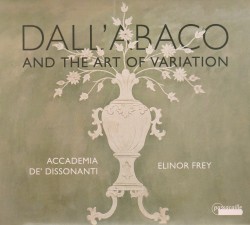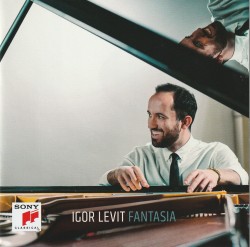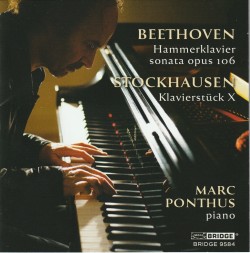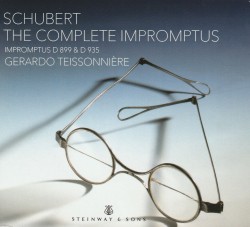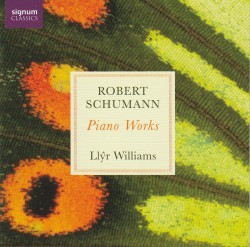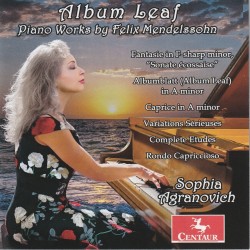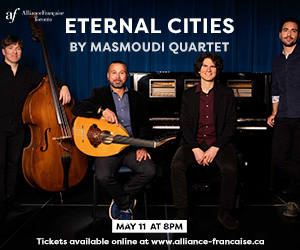Strings Attached - April 2024
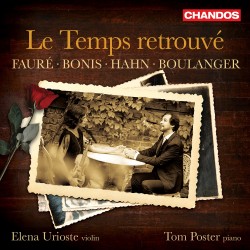 The three French sonatas that form the bulk of Le Temps retrouvé, the new CD from the brilliant husband-and-wife duo of violinist Elena Urioste and pianist Tom Poster, were all published during the decade 1916-26, a period of great change in the musical landscape (Chandos CHAN 20275 chandos.net/products/catalogue/CHAN%2020275).
The three French sonatas that form the bulk of Le Temps retrouvé, the new CD from the brilliant husband-and-wife duo of violinist Elena Urioste and pianist Tom Poster, were all published during the decade 1916-26, a period of great change in the musical landscape (Chandos CHAN 20275 chandos.net/products/catalogue/CHAN%2020275).
Despite initial parental opposition and a life of domestic upheaval Mélanie, Bonis (1858-1937) composed a huge amount of music, most of which still lies unexplored. Her Violin Sonata in F-sharp Minor Op.112 is a fascinating and profoundly musical work.
Fauré’s Violin Sonata No.2 in E Minor Op.108 from 1916-17 is from his late, forward-looking period, but those typical sweeping piano arpeggios and flowing melodies still abound.
Apart from the remarkable Veloce middle movement (literally a short ride in a fast car) Reynaldo Hahn’s lyrical and warm Violin Sonata in C Major from 1926 looks back nostalgically to a gentler time.
Lili Boulanger’s popular Nocturne, published in 1914, provides a suitably dreamy ending to a superb disc.
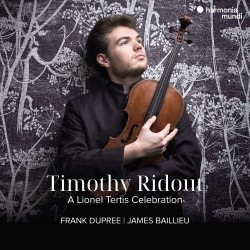 On A Lionel Tertis Celebration the violist Timothy Ridout, winner of the 2016 Lionel Tertis Competition, pays tribute to the legendary English viola player with an outstanding 2CD recital featuring compositions and arrangements by Tertis himself as well as works by his friends and students. Frank Dupree is the pianist on CD1, and James Baillieu on CD2 (harmonia mundi HMM9053767.77 harmoniamundi.com/en/albums/a-lionel-tertis-celebration)
On A Lionel Tertis Celebration the violist Timothy Ridout, winner of the 2016 Lionel Tertis Competition, pays tribute to the legendary English viola player with an outstanding 2CD recital featuring compositions and arrangements by Tertis himself as well as works by his friends and students. Frank Dupree is the pianist on CD1, and James Baillieu on CD2 (harmonia mundi HMM9053767.77 harmoniamundi.com/en/albums/a-lionel-tertis-celebration)
Stirring performances of two major works by Tertis students bookend the recital, York Bowen’s Viola Sonata No.1 in C Minor Op.18 opening CD1 and Rebecca Clarke’s Viola Sonata closing CD2. Sunset and Hier au Soir are Tertis originals, and there are arrangements by him of short pieces by Brahms, Schumann, Fauré and Mendelssohn, as well as by John Ireland and William Wolstenholme.
Other composers represented are Frank Bridge, Eric Coates, Cecil Forsyth, Vaughan Williams, Bowen and Wolstenholme again, and W. H. “Billy” Reed of Elgar violin concerto fame, whose lovely Rhapsody opens CD2. Two Kreisler works close CD1: Ridout’s own arrangement of Liebeslied; and a stunning performance of Alan Arnold’s arrangement of the Praeludium and Allegro.
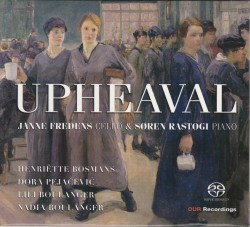 That same tumultuous period is central to Upheaval, with cellist Janne Fredens and pianist Søren Rastogi presenting compositions by four female composers active around the First World War years (OUR Recordings 6.220683 ourrecordings.com).
That same tumultuous period is central to Upheaval, with cellist Janne Fredens and pianist Søren Rastogi presenting compositions by four female composers active around the First World War years (OUR Recordings 6.220683 ourrecordings.com).
The Dutch pianist and composer Henriëtte Bosmans (1895-1952), whose career was disrupted by the Nazi occupation in the1940s and never recovered, is represented by her 1919 Cello Sonata in A Minor. The reputation of the prolific Croatian composer Dora Pejačević (1885-1923) continues to grow following the recent revival of her terrific Symphony in F-sharp Minor. Her 1913 Cello Sonata in E Minor Op.35 is a striking and substantial late-Romantic work, showing the clear influence of Brahms and Dvořák.
Two pieces by the Boulanger sisters, Lili’s Nocturne again and Nadia’s Trois pièces from 1911 complete an excellent disc full of sensitive and finely judged playing.
Listen to 'Upheaval' Now in the Listening Room
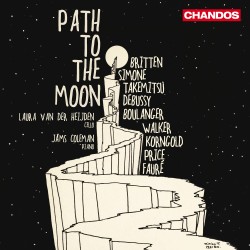 William T. Horton’s fantastic image The Path to the Moon was the inspiration for the new album from cellist Laura van der Heijden and pianist Jâms Coleman, their CD Path to the Moon including music relating to the moon and the night, as well as works evoking mankind’s striving for new heights (Chandos CHAN 20274 chandos.net/products/catalogue/CHAN%2020274).
William T. Horton’s fantastic image The Path to the Moon was the inspiration for the new album from cellist Laura van der Heijden and pianist Jâms Coleman, their CD Path to the Moon including music relating to the moon and the night, as well as works evoking mankind’s striving for new heights (Chandos CHAN 20274 chandos.net/products/catalogue/CHAN%2020274).
It’s an eclectic program anchored by three 20th-century sonatas: the 1957 Cello Sonata by the American George Walker; Britten’s Sonata Op.65 and Debussy’s 1915 Cello Sonata.
Fittingly, given the singing nature of van der Heijden’s playing, virtually all of the transcriptions are of vocal music: Korngold’s Schönste Nacht; Lili Boulanger’s Reflets; Florence Price’s Night; Britten’s Sonetto XXX; Debussy’s Beau soir; Fauré’s Clair de lune; Takemitsu’s Will Tomorrow, I Wonder, Be Cloudy or Clear?; and Nina Simone’s take on Jonathan King’s Everyone’s Gone to the Moon. Debussy’s Clair de lune ends a lovely disc.
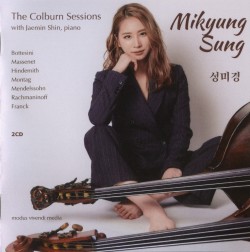 The South Korean double-bassist Mikyung Sung is the remarkable soloist on The Colburn Sessions, a brilliant two-disc set where she is ably supported by pianist Jaemin Shin, the two having worked together in the Artist Diploma course at the Colburn School in Los Angeles in 2017 (Modus Vivendi Media MVM 2301 mikyungbass.bandcamp.com/album/the-colburn-sessions).
The South Korean double-bassist Mikyung Sung is the remarkable soloist on The Colburn Sessions, a brilliant two-disc set where she is ably supported by pianist Jaemin Shin, the two having worked together in the Artist Diploma course at the Colburn School in Los Angeles in 2017 (Modus Vivendi Media MVM 2301 mikyungbass.bandcamp.com/album/the-colburn-sessions).
Bottesini’s Tarantella is a dazzling opening track, Sung displaying stunning facility and clarity. The same composer’s Capriccio di Bravura and the more lyrical Elegy No.1 are followed by a transcription of the Meditation from Massenet’s Thaïs. Hindemith’s Sonata for Double Bass and Piano and the impressive 1967 Sonata for Double Bass and Piano by Hungarian composer Vilmos Montag (1908-91) end disc 1.
The second CD is even more impressive, with the Andante from Rachmaninoff’s Cello Sonata Op.19 sandwiched between two outstanding sonatas: Mendelssohn’s Cello Sonata No.2 Op.58 with an astonishing final movement that takes your breath away, and Franck’s Violin Sonata in A Major in the composer-endorsed transcription for cello by Jules Delsart, Sung playing direct from the cello part – which she presumably also does with the Mendelssohn.
Superb playing from both performers is beautifully captured in single continuous takes live to stereo. Complete performances of the Hindemith, Mendelssohn and Franck sonatas can be viewed on Sung’s website, mikyungbass.com.
Listen to 'The Colburn Sessions' Now in the Listening Room
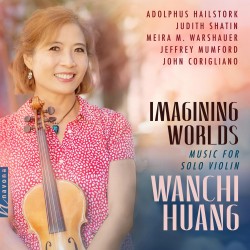 Wanchi Huang is the violinist on Imagining Worlds – Music for Solo Violin, a CD that features new music by composers described as compelling voices in contemporary American music (Navona Records NV6592 navonarecords.com/catalog/nv6592).
Wanchi Huang is the violinist on Imagining Worlds – Music for Solo Violin, a CD that features new music by composers described as compelling voices in contemporary American music (Navona Records NV6592 navonarecords.com/catalog/nv6592).
The recital comprises Adolphus Hailstork’s rather bland Suite for Solo Violin, Judith Shatin’s somewhat oppressive For the Fallen – for Amplified Violin and Electronics, Meira Warshauer’s Jewish-influenced In Memoriam and Brach (Blessing), and Jeffrey Mumford’s an expanding distance of multiple voices, the five movements totaling only 11 minutes. John Corigliano’s Red Violin Caprices completes the disc.
There’s interesting writing on display here, but only the Corigliano really leaps out and separates itself from the crowd; it certainly brings by far the best playing from Huang.
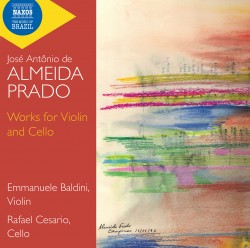 The music of a Brazilian composer who lived from 1943 to 2010 is explored on José Antônio de Almeida Prado Works for Violin and Cello, a new addition to The Music of Brazil series featuring violinist Emmanuele Baldini and cellist Rafael Cesario (Naxos 8.574459 naxos.com/Search/KeywordSearchResults/?q=Almeida%20Prado%20-%20Works%20for%20Violin%20and%20Cello).
The music of a Brazilian composer who lived from 1943 to 2010 is explored on José Antônio de Almeida Prado Works for Violin and Cello, a new addition to The Music of Brazil series featuring violinist Emmanuele Baldini and cellist Rafael Cesario (Naxos 8.574459 naxos.com/Search/KeywordSearchResults/?q=Almeida%20Prado%20-%20Works%20for%20Violin%20and%20Cello).
Only two works – Le livre magique de Xangô from 1985 and Das Cirandas from 1999 – are duets. The 2004 Praeambulum for solo cello was commissioned as an intro to Bach’s Cello Suite No.3 in C Major BWV1009, while The Four Seasons for solo violin was written for a young performers’ national competition in 1984, each brief movement a study in various violin techniques.
The lyrical and extremely brief – under two minutes – Capriccio für Constança und Ana Luiza from 1998 and the Solo Violin Sonata from 2000, dedicated to his daughter, one of Brazil’s leading violinists and the most substantial work on the CD, end a recital of solid performances but with few real musical high points.
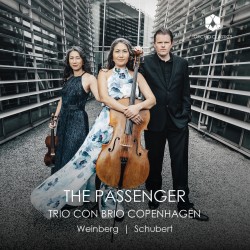 The Trio con Brio Copenhagen, which celebrates its 25th anniversary this year performs piano trios by Mieczyslaw Weinberg and Franz Schubert on The Passenger, a CD that surveys two young composers whose compositions offer poignant reflections on life, mortality and ethereal beauty (Orchid Classics ORC100282 orchidclassics.com).
The Trio con Brio Copenhagen, which celebrates its 25th anniversary this year performs piano trios by Mieczyslaw Weinberg and Franz Schubert on The Passenger, a CD that surveys two young composers whose compositions offer poignant reflections on life, mortality and ethereal beauty (Orchid Classics ORC100282 orchidclassics.com).
Weinberg was a Polish Jew who fled Warsaw when the Nazis invaded. His Piano Trio Op.24 was written in Moscow in 1945 when he was 25; characterized by unrest and despair, it occupies much the same sound world as that of his friend Shostakovich. The finale features a waltz that foreshadows his opera The Passenger, where a waltz links the evil of a concentration camp to an uncertain future.
Written in 1827, just a year before his early death, Schubert’s Piano Trio No.2 in E-flat Major Op.100 grew from Schubert’s encounter with the Swedish song Se solen sjunker, which describes the sinking sun and all hope being chased away by night’s shadows. The funeral march of the second movement, based on the song, is the emotional centre of the work.
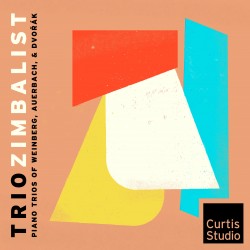 The Weinberg work is also heard on Piano Trios of Weinberg, Auerbach & Dvořák, a top-notch debut CD by Trio Zimbalist intended as “a heartfelt response to the enduring human struggle unfolding around the world” (Curtis Studio curtis.edu/curtis-studio).
The Weinberg work is also heard on Piano Trios of Weinberg, Auerbach & Dvořák, a top-notch debut CD by Trio Zimbalist intended as “a heartfelt response to the enduring human struggle unfolding around the world” (Curtis Studio curtis.edu/curtis-studio).
The album is cast in the spirit of the Dumka, a Ukrainian term meaning “thought.” In music, Dumky were sung by traveling minstrels, and often expressed the laments of oppressed people. It was this form that Dvořák used as the basis for his Piano Trio No.4 in E Minor Op.90, “Dumky”, an extensive six-movement work that closes the disc.
We have already noted the circumstances surrounding the composition of the Weinberg trio. Lera Auerbach’s quite brief but striking three-movement Piano Trio No.1 Op.28 with its impassioned middle Andante lamentoso movement and eerie and aggressive finale, was written following her defection from the Soviet Union in 1991. The Dvořák also fits in here: it is often overlooked that performances of his works were suppressed in the Czechoslovak Republic for a while after 1945.
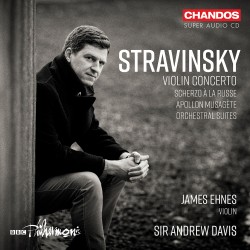 There are two Stravinsky Violin Concerto CDs this month, one featuring James Ehnes with the BBC Philharmonic under Sir Andrew Davis (Chandos CHSA5340 chandos.net/products/catalogue/CHSA%205340) and the other with Frank Peter Zimmermann and the Bamberger Symphoniker under Jakub Hrůša (BIS-2657 prestomusic.com/classical/products/95571 – Igor-stravinsky-bartok-martin).
There are two Stravinsky Violin Concerto CDs this month, one featuring James Ehnes with the BBC Philharmonic under Sir Andrew Davis (Chandos CHSA5340 chandos.net/products/catalogue/CHSA%205340) and the other with Frank Peter Zimmermann and the Bamberger Symphoniker under Jakub Hrůša (BIS-2657 prestomusic.com/classical/products/95571 – Igor-stravinsky-bartok-martin).
Written for – and premiered by – Samuel Dushkin in 1932, the concerto is a four-movement work in Stravinsky’s neo-classical style. Ehnes is his usual flawless self in a supremely confident performance, as smooth as ever and with a clear, pure tone, especially in the two middle Arias. The rest of the Chandos Stravinsky disc is orchestral music in really fine performances: the Scherzo à la Russe, a showpiece written for the Paul Whiteman band on the composer’s arrival in California in the early 1940s; the Suites Nos.1 & 2, arranged from piano duets from the 1910s; and Apollo Musagète, a ballet in two parts for strings from 1927-28 that marked a complete rejection of his previous ballets and a move to pure form.
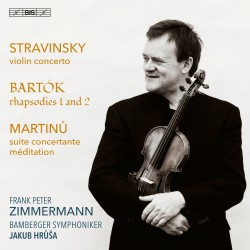 The Zimmermann disc, on the other hand, is all violin and orchestra, linking composers who put down roots in the West without abandoning their Eastern European identities. Zimmermann’s Stravinsky concerto is another outstanding performance, albeit a fair bit faster than Ehnes: the Zimmermann timings for the four movements, which only range from four to six minutes in length, are a significant 20 to 30 seconds shorter than those of Ehnes. There’s no real sense of a faster or spikier approach here though, with Ehnes and Davis possibly just more relaxed in tempo. Dushkin also premiered Bartók’s Rhapsodies Nos.1 & 2, given outstanding performances here, as well as the 1943 New York version with piano of Martinů’s Suite concertante, which has two versions. The second, heard here, was started in 1938 in Paris before Martinů left Europe, and completed in New York and orchestrated in 1945. While still in Paris Martinů apparently wrote three movements for another version of the suite, one of which – Méditation – completes a terrific CD.
The Zimmermann disc, on the other hand, is all violin and orchestra, linking composers who put down roots in the West without abandoning their Eastern European identities. Zimmermann’s Stravinsky concerto is another outstanding performance, albeit a fair bit faster than Ehnes: the Zimmermann timings for the four movements, which only range from four to six minutes in length, are a significant 20 to 30 seconds shorter than those of Ehnes. There’s no real sense of a faster or spikier approach here though, with Ehnes and Davis possibly just more relaxed in tempo. Dushkin also premiered Bartók’s Rhapsodies Nos.1 & 2, given outstanding performances here, as well as the 1943 New York version with piano of Martinů’s Suite concertante, which has two versions. The second, heard here, was started in 1938 in Paris before Martinů left Europe, and completed in New York and orchestrated in 1945. While still in Paris Martinů apparently wrote three movements for another version of the suite, one of which – Méditation – completes a terrific CD.
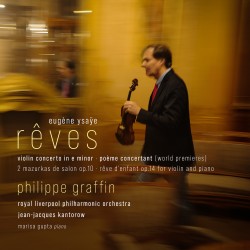 Eugène Ysaÿe: Rêves features world-premiere recordings of two newly discovered concertos by the Belgian virtuoso and composer in performances by Philippe Graffin and the Royal Liverpool Philharmonic Orchestra under Jean-Jacques Kantorow (Avie Records AV2650 avie-records.com).
Eugène Ysaÿe: Rêves features world-premiere recordings of two newly discovered concertos by the Belgian virtuoso and composer in performances by Philippe Graffin and the Royal Liverpool Philharmonic Orchestra under Jean-Jacques Kantorow (Avie Records AV2650 avie-records.com).
Following the recent discovery of a first movement of an early Violin Concerto in E Minor a fully orchestrated second movement and a third movement in violin and piano score both came to light, the latter being orchestrated by Ysaÿe expert Xavier Falques to complete the concerto. Composed in 1884-85 it was apparently intended to establish a new approach to instrumental technique, which Ysaÿe felt had stagnated since the works of Vieuxtemps.
It’s not clear why he abandoned the concerto, but in 1893 Ysaÿe wrote his Poème concertant, a single-movement work imbued with love for his student Irma Sèthe. Recently discovered in manuscript form, it was orchestrated by Erika Vega with advice from Falques.
Pianist Marisa Gupta joins Graffin for the 2 Mazurkas de salon Op.10 and the Rêve d’enfant Op.14 that close a fascinating CD.
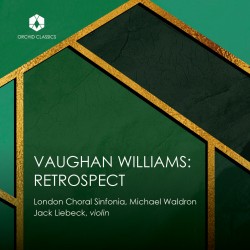 There’s a glorious CD of Vaughan Williams music that would normally be well outside the limits of this column, but Vaughan Williams: Retrospect with the London Choral Sinfonia under Michael Waldron contains not only some simply beautiful works for voices and string orchestra but also a lovely performance of the Violin Concerto in D Minor – Concerto Accademico with the always reliable Jack Liebeck as soloist (Orchid Classics ORC100289 orchidclassics.com).
There’s a glorious CD of Vaughan Williams music that would normally be well outside the limits of this column, but Vaughan Williams: Retrospect with the London Choral Sinfonia under Michael Waldron contains not only some simply beautiful works for voices and string orchestra but also a lovely performance of the Violin Concerto in D Minor – Concerto Accademico with the always reliable Jack Liebeck as soloist (Orchid Classics ORC100289 orchidclassics.com).
It’s not a substantial work – only about 16 minutes long – but the glorious middle movement, which takes up almost half of the work, is Vaughan Williams at his pastoral best and Liebeck is in his element. As an added bonus, cellist Thomas Carroll is the lovely soloist in the world-premiere recording of the composer’s arrangement of Bach’s Schmücke dich,o liebe Seele.
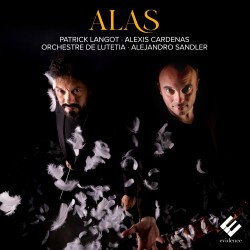 On ALAS cellist Patrick Langot and violinist Alexis Cardenas and the Orchestra de Lutetia under Alejandro Sandler pay tribute to the Argentinian music so dear to their hearts by presenting world-premiere recordings of works by three contemporary Argentinian composers (Évidence Classics EVCD108 orchestredelutetia.com/alas).
On ALAS cellist Patrick Langot and violinist Alexis Cardenas and the Orchestra de Lutetia under Alejandro Sandler pay tribute to the Argentinian music so dear to their hearts by presenting world-premiere recordings of works by three contemporary Argentinian composers (Évidence Classics EVCD108 orchestredelutetia.com/alas).
The title track, the 2021 Alas – fantaisie for violin, cello and string orchestra by Gerardo di Giusto (b.1961) is a strong, strident work with malambo and baguala rhythms, while the atmospheric 2020 Descaminos for solo cello, string orchestra and percussion by Gabriel Sivak (b.1979) was inspired by the vast Pampas region. Both works were commissioned by the orchestra.
The fascinating 1986 Llorando silencios, six Quechua songs for solo cello by Alejandro Iglesias Rossi (b.1960) evokes ancestral sonorities, the cello sounding in turn like the traditional instruments the quena, charango and erke.
The remainder of the CD is given over to the 1953 Variaciones concertantes Op.23 by Alberto Ginastera, the cello and harp being joined by various orchestral soloists to develop the thematic material, with an explosive malambo finale.
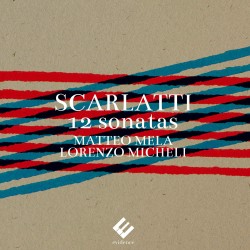 In a 1953 essay the Domenico Scarlatti biographer Ralph Kirkpatrick (who implemented the K. numbering system) noted the clear influence of the Spanish guitar on Scarlatti’s music, and the extent to which it permeated his keyboard works is beautifully illustrated on the digital-only release Scarlatti 12 Sonatas by the two guitarists Matteo Mela and Lorenzo Micheli (Evidence EVCD107 soloduo.it).
In a 1953 essay the Domenico Scarlatti biographer Ralph Kirkpatrick (who implemented the K. numbering system) noted the clear influence of the Spanish guitar on Scarlatti’s music, and the extent to which it permeated his keyboard works is beautifully illustrated on the digital-only release Scarlatti 12 Sonatas by the two guitarists Matteo Mela and Lorenzo Micheli (Evidence EVCD107 soloduo.it).
As Micheli’s booklet notes point out, Scarlatti’s language often echoes guitar playing, the Hispanic character stemming from timbres, techniques and stylistic traits derived from the guitar, and the light, volatile style of writing in the sonatas, most often for two voices is perfectly suited to the nature of the guitar. The 12 sonatas here are those numbered K.8, K.24, K.32, K.87, K.99, K.162, K.202, K.386, K.455, K.466, K.519 and K.531.
Superb transcriptions (uncredited, but by the performers, presumably) and simply outstanding playing, beautifully recorded, result in a truly captivating release.


